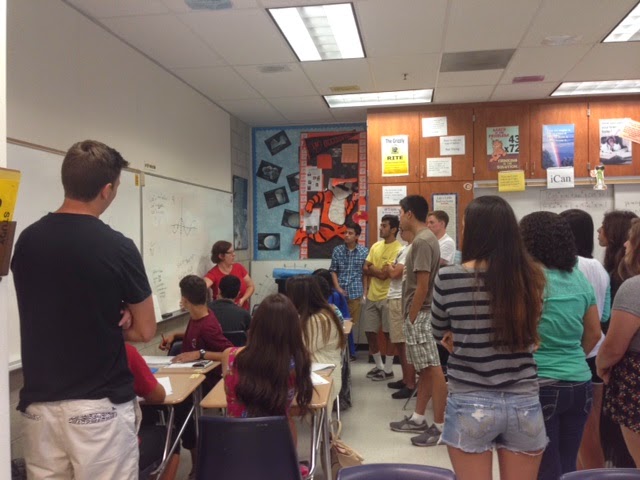Calc class today



I gave the kids the following problem.
First "funny conversation":
Student: What does it say in the upper right? (student was on opposite side of room from whiteboard where this was displayed).
Me: You realize you can get up and go see, right?
Student: Oh.
Me: Time out class! In case you haven't figured it out, this is a non-stationary class. If you can't see something, get up and move so that you can! If you don't want to sit in your desk at all this period, I won't care! As a matter of fact, I think next year, I'm asking for just benches. It will look like a sports field sideline with nothing but benches for the players to throw their "stuff" on. Oh the assistant principal is going to hate me! Who wants to sit in these hard desks anyway! Not me!
It's taking a little bit of time, but more and more students are buying into this idea of working on the whiteboards. I love it! And having them wrestle with this problem was great! They did all get to the answer (at different times) and I was then able to show them the lesson on Mooculus that will require their understanding of the slope formula for finding slopes of tangents. NOW, they will have no problem with the practice problems. Still in love with that website!
Second "funny conversation":
Student 1: Do we have to speak English when we discuss this?
Me: As opposed to what else?
Student 1: Togala! 3 of us can speak that to each other.
Student 2: Except for me.
Me: You can speak anything you want, but remember, you want everyone to be able to participate. So, I guess you will need to make sure you write down ALL your work so "he" can follow what you are doing.
Student 3: Yes, math is a universal language!
It was just so enjoyable that they were so excited to talk about the problem and it made it easier for them to speak in "their" language. I would never have known that in my old classroom setting. This new work space is so AMAZING for getting to know the students (on their level(s)).
After we did that warm-up exercise, I made them create a folder on Google Drive and share it with me. Inside that folder, they were to write me a Friday letter. I got this idea from Twitter Math Camp via Rebecka Peterson (@RebeckaMozdeh). I told the students that I wanted them to write about how they felt being in this classroom/Calc class. I know this was a huge mind shift. When has any teacher cared about that?! Least of all a math teacher!! I cannot wait to read them! If kids were not on a laptop, they could write me an old fashioned letter (yes on paper with ink) and hand deliver it to me. I also said if any parent had an old mailbox in the garage that they were never going to use again, I would love having as the "old fashioned mail" depository.
If students finished early, I had a puzzle for them up on the screen. It was trivia questions from this fantastic site. The students were going crazy trying to answer them (or be the first to answer them). All of a sudden, I notice a student trying to look something up on his cell phone (answer to a question). Keep in mind that he still had a laptop sitting on the desk in front of him.
Me: "student", you realize that you have a laptop in front of you, right?
Student: oh yeah!
Class: (laughing!!)
Stats class
This is the problem of the day today for stats. I did another (easier) version with them to get them started. I asked them how they were going to prove the y-values that they needed to find lengths of vertical heights/bases. This took some serious thinking on their part. Eventually they led me to similar triangles or using slope and equation of a line. Awesome! This problem really made them "up their game"! Some still have to finish over the weekend. It's so wonderful to hear all the explaining that goes on amongst them. NOT me doing it, THEM doing it while I listen. I only interject if I need to. How empowering for them!




.JPG)
.JPG)
































.JPG)


.JPG)


.JPG)



.JPG)
.JPG)
.JPG)
.JPG)
.JPG)
.JPG)